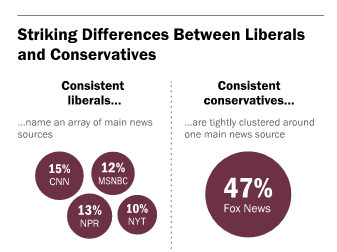Pew: Liberals, conservatives live in their own media bubbles
Among the roughly 20 percent of the American public that comprises the most ardent liberals and conservatives, there is almost no agreement on which news sources are trustworthy, a major report on political polarization from the Pew Research Journalism Project finds.
The year-long study looked at how people get their political information from the news media, social media and friends and family.
There were several news outlets liberals cited as their main source of news. Fifteen percent of those respondents said they relied mostly on CNN for news; 13 percent chose NPR; 12 percent said MSNBC; and 10 percent picked the New York Times.
Conservatives, however, have a far more clear cut preference: nearly half of respondents, 47 percent, rely on Fox News as their main source of information about government and politics.
They also have very different views on whether news outlets are to be trusted, with liberals expressing far more trust in media overall. Pew asked respondents about whether they trust 36 different media outlets ranging from network news channels to major newspapers to shows like "The Daily Show" and "The Colbert Report." The most liberal respondents said they trust more than they distrust 28 of the 36 outlets, while the most conservative respondents expressed more distrust of 24 of the 36.
Nearly all news outlets that were trusted by one end of the political spectrum were distrusted by the other end. There were two exceptions: all of the five political groupings polled by Pew (consistently liberal, mostly liberal, mixed, mostly conservative and consistently conservative) trust the Wall Street Journal more than they distrust it. All of the groups distrust the website Buzzfeed more than they trust it, though less than 40 percent of respondents had heard of the site.
Social media by its nature, makes it difficult to shut out all other political opinions. But consistent conservatives are twice as likely as the average Facebook user to see political opinions on the site, and 47 percent report that the posts they see are typically in line with their views.
Just 32 percent of the most liberal respondents said the same thing, but they were far more likely to report having hidden, blocked, de-friended or stopped following someone because they disagreed with a political post. Just 31 percent of the consistently conservative respondents said they had done the same.
Sixty percent of liberals are more likely to "like" or follow groups that promote a specific issue. Just 46 percent of the most conservative respondents and 33 percent of those with mixed views are likely to follow these kinds of groups.
One behavior both sides of the political spectrum have in common is the habit of sharing political views with friends and family. Overall, just a quarter of people in the Pew survey said most of their close friends share their political views, but among liberals that number was about half (52 percent) and it rose to two thirds (66 percent) among conservatives. Conservatives are more likely to report having the same political views as most of their close friends, but liberals are more likely to say they stopped talking to or being friends with someone because of their political views.
